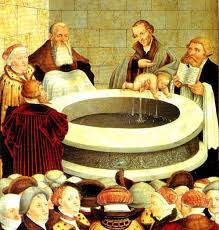
Does the timing of its discussion in the Book of Mormon seem strange? Mormon writes to his son Moroni, ch8:5 he has heard of disputations concerning the baptism of little children. Mormon has the word of the Lord reaching him by the power of the Holy Ghost informing him that it is a solemn mockery to baptise little children. In the same epistle Mormon informs his son that his people are seeking to put down all authority that cometh from God, that they are behaving in deprived ways, being without mercy or order, that they are perverted.
I always found the timing of a polemic against infant baptism during the end of the Nephite civilisation baffling. Firstly, if Jesus had taught the Nephites how to baptise, giving them authority, he would have shared who to baptise. Given that they had nearly three hundred years of peace, why should we suppose that the baptismal threshold changed. Why would Mormon need heavenly guidance on this issue when the rites and precedents already existed. Secondly, why would a people who had given up God be in dispute about the age of baptism, why discuss it? It seems to me, that there had never been a more incongruent time to debate infant baptism.
So why is it included in the Book of Mormon? Was Joseph thinking, I have discussed most of the controversial issues of my day, but here is one that needs covering. Contextually, Josephs views on the subject would not have gone down too well with his Father in Law’s family because as Methodists they would have practiced infant baptism. Additionally, Alexander Campbell, founder of Disciples of Christ, (including Sidney Rigdon) observed the book of Mormon covered “every error and almost every truth discussed in New York for the last ten years. He decided all the great controversies: — infant baptism, ordination, the trinity, regeneration, repentance, justification, the fall of man, the atonement, transubstantiation, fasting penance, church government, religious experience, the call to the ministry, the general resurrection, eternal punishment, who may baptize, and even the questions of free masonry, republican government and the rights of man.”